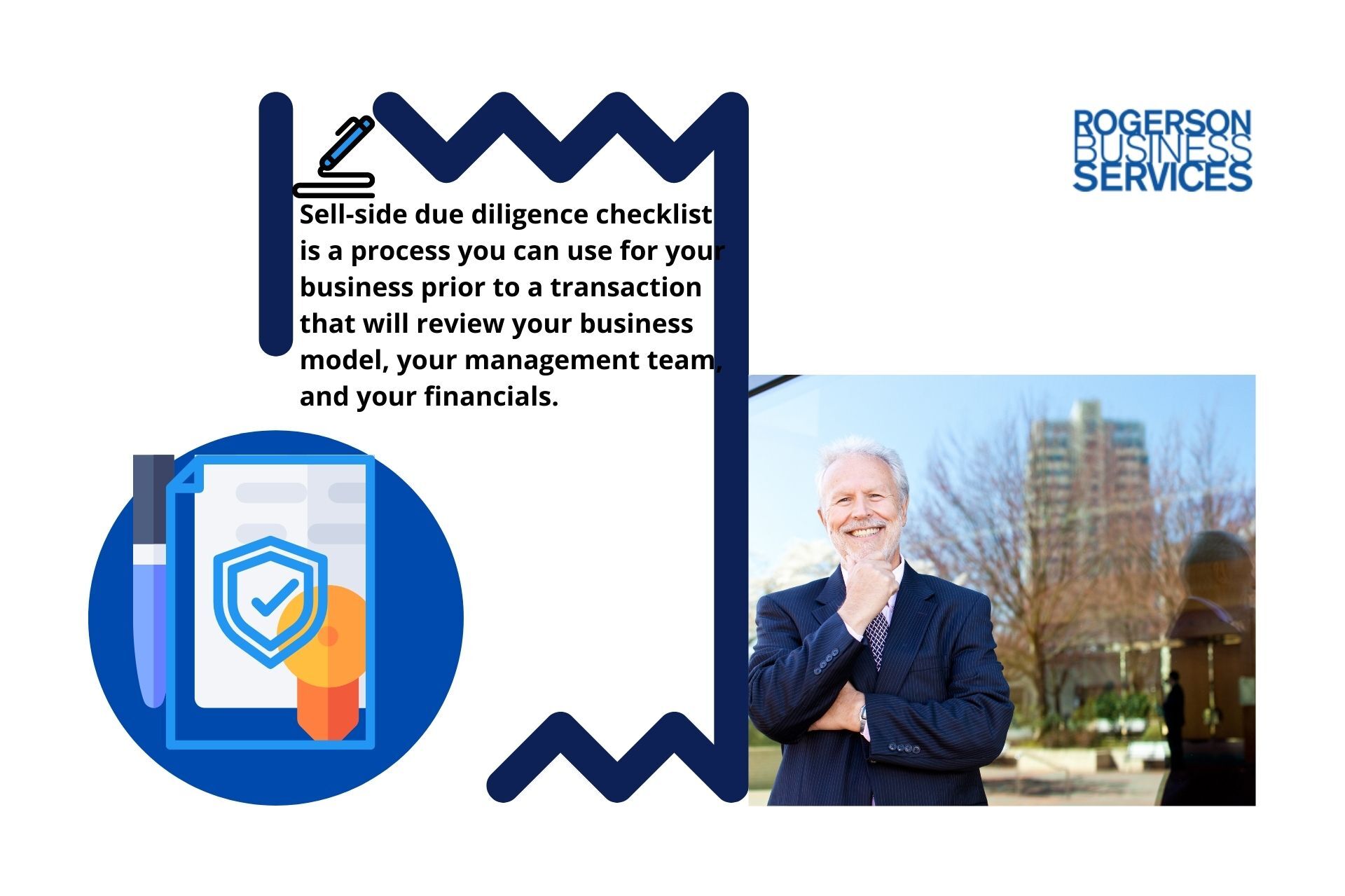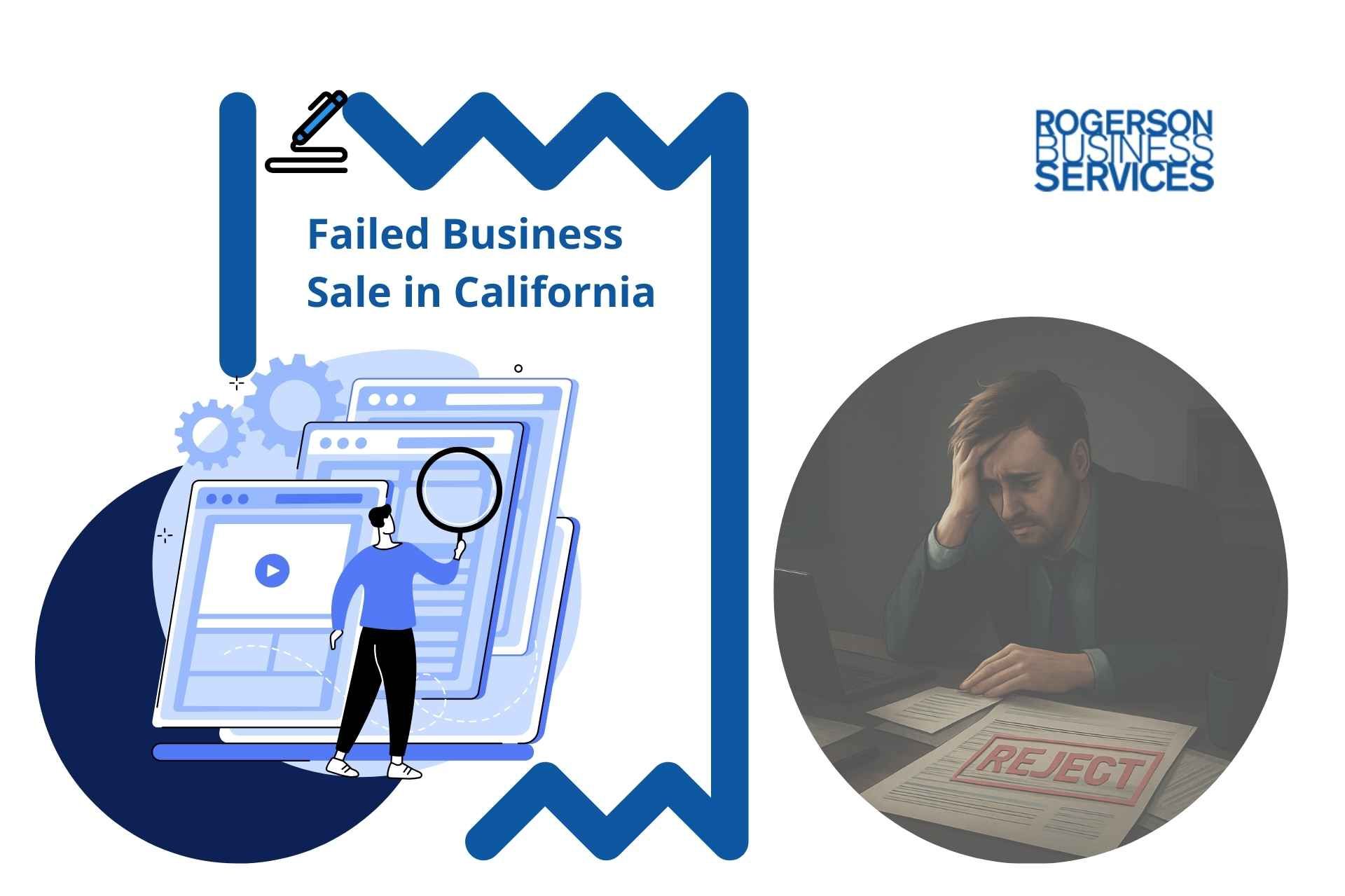Sell Side Due Diligence Checklist When Selling a Business in California
Sell Side Due Diligence Checklist

As a lower-middle-market business owner looking to sell your business, using this sell-side due diligence checklist will keep you on track.
What is sell-side due diligence checklist? It is a process you can use for your business prior to a transaction that will review your business model, your management team, and your financials.
Due Diligence Best Practices
Stay focused on the process. Review your business model, your financials, and other pertinent details. When conducting your due diligence, your goals are as follows:
- Ensure your historical financials are accurate,
- Support your future projections,
- Determine whether your business supports growth.
Here are some best practices when conducting due diligence for selling a business.
Describe the Organization of Your Company
Gather your articles of incorporation and by-laws. Describe who owns your company and who has vested control. Include stockholders, voting decisions, and all other information pertinent to this matter.
Review All of Your Financials
Review your annual sales and profit and all matters relating to finances, including accounts receivable, business taxes, current investors, and a synopsis of your debts.
Make your review of financials as comprehensive as possible, which will help all parties involved. You can find additional information on financial due diligence here.
Review All of Your Legal Matters
Legal matters should never go overlooked because they determine how risky your business is. So gather your legal records and have them on hand. These documents should include lists of any litigation past or present and government investigations.
Regulations and Compliances
These documents would include permits, environmental matters such as site assessments or audits, and inspection dates. For a deep dive into these matters, this is an excellent source.
Compile Intellectual Property
Intellectual property includes trademarks or copyrights. List your intellectual property rights here as well. Include information about your IT department with this also. The way you protect your intellectual property is important.
Gather Appraisals or Certificates
It is also a good idea to include human resources policies here. It would also serve you well to accumulate your tax and marketing information. For a comprehensive breakdown of the due diligence process, read more at this site.
The Due Diligence Report
After completing your best practices checklist, you will need to move on to your due diligence report. Your due diligence report is paramount to selling your business.
A due diligence report includes pertinent corporate records, copies of audited financial statements, any debt, all related real estate, any agreements that the company has entered into, employee and customer information, and copies of legal documents or licenses.
If you're selling your business and planning to retire, it is essential to have a solid and structured due diligence report. Keep your topics simple. This template provides a comprehensive checklist. Your due diligence report should include the following topics:
- The Executive Summary: The outline of your key items and topics.
- Your Quality of Earnings (QoE): QoE works in tandem with the working capital portion of your due diligence report. Your QoE is where you will place non-recurring events and items that fall outside the day-to-day operations of your business.
- Your Working Capital (or Net Working Capital): Report your business's operating cash flow.
- Income Statement: Reports your losses and profits.
- Balance Sheet: Outline your total assets. Your assets are financed through either your debt or your equity. A simple balance sheet includes your total assets, total liabilities, and total shareholders' equity.
- Supplemental Analysis: Detail your operations and distinguish yourself from your competition. Use this topic to explain your business identity, what you stand for, and what makes you valuable.
Merger and Acquisition During the Due Diligence Process
Due diligence is vital to reaching the merger and acquisition stage. Moreover, it is key to a successful sale because it provides the buyer with an opportunity to assess all the necessary information about you, the seller.
When the buyer has access to your financials, documents, and earnings, they can verify your assets and value. Therefore, a comprehensive and in-depth due diligence report can efficiently streamline the acquisition process.
Here is a short list of some common mergers & acquisitions (M&A) due diligence activities you can expect during the selling process.
- Financial Matters: Buyers expect to know whether the business can sustain itself throughout the conclusion of the merger or acquisition.
- Your Customers: This includes what benefits and risks come along with them. For example, will any customers be explicitly lost because of the acquisition?
- Overall fit with the buyer: Your buyer will want to know if your business has products and people beneficial to their purchase. Additionally, they might want to know the general morale.
- Personnel Issues: This merger and acquisition activity integrates with the overall fit with the buyer. Are there or will there be labor disputes? What are the current employee benefits or retirement plans, if any?
- The Competitive Landscape: Expect your potential buyers to want knowledge regarding your company's competitors, both present and future. They will also be interested in what advantages or disadvantages your business and its products have compared to your competitors.
These are just a few examples of activities related to due diligence during the merger and acquisition process. You can find a more exhaustive list here. When selling your business, take those extra steps to acquire any pertinent information a potential buyer would want to know.
Sell-Side Advisors
Finally, you may want to consider hiring a sell-side advisor. Advisors provide a wide variety of benefits. Advisors are invaluable when getting the deal done smoothly and on your own terms is a priority.
One reward from hiring a sell-side advisor is the access to potential buyers they bring. Advisors have a vast knowledge of the industry and can develop very successful marketing strategies to attract buyers to bid top price for your business.
Sell-side advisors have the tools to navigate through unpredictable challenges. Many of those challenges, such as market volatility, may become troublesome without the aid of an advisor.
Conclusion
Advisors deliver peace of mind. They eliminate uncertainty and provide safety nets if deals sour. As a result, an advisor is an excellent asset, especially if you desire a seamless transition between selling your business and retirement. In addition, using a Sell-Side Due Diligence Checklist will help you better understand how your business is doing and if it is on track.
If you have decided to value and then sell your lower middle market business now or within the next six to twelve months in California, click here to get started with this quick and simple form, or call Andrew Rogerson, Certified M&A Advisor, so we can understand your pain points better and prioritize your inquiry with Rogerson Business Services, RBS Advisors.
This is part of business owner tips to answer how Rogerson Business Services attract qualified buyers to sell your business series ->
Hey there! Can we send you a gift?
We just wanted to say hi and thanks for stopping by our little corner of the web. :) we'd love to offer you a cup of coffee/tea, but, alas, this is the Internet.
However, we think you'll love our email newsletter about building value and properly position your company before transition/exit your business ownership.
As a special welcome gift for subscribing, you'll also get our helping and educational guides, tips, tutorials, etc.. for free.
It's filled with the best practices for retiring serial business owners like Dan Gilbert, Larry Ellison, Warren Buffett, and many more.
Just sign up for our emails below.


